|
|
|
Sort Order |
|
|
|
Items / Page
|
|
|
|
|
|
|
| Srl | Item |
| 1 |
ID:
163112
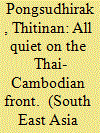

|
|
|
|
|
| Summary/Abstract |
That Thai-Cambodian relations are stable and peaceful after Thailand’s most recent military coup in 2014 is counterintuitive and inconsistent with recent trends and dynamics. When governments loyal to Thaksin Shinawatra took power over the past decade, bilateral relations were cordial and constructive. Conversely, when anti-Thaksin governments were in office, Thai-Cambodian relations became unstable and adversarial. But this has not been the case after the military regime under General Prayut Chan-ocha seized power and overthrew the Thaksin-aligned government of Prime Minister Yingluck Shinawatra. The dominant strand of scholarly explanations attributes the volatile bilateral relationship to Thai historical forces interacting with domestic politics, underpinned by a ‘national humiliation’ discourse dating to French imperialism. But such an informed understanding is unable to pinpoint the timing and extent of the bilateral conflict when it flared up. Synthesising overlapping streams of literature and drawing on select interviews, this article sets out to demonstrate that the post-coup Thai government’s commitment and resolve to prevail at all costs ahead of the royal succession and the incumbent Cambodian government’s weakened political legitimacy at home have combined to situate and normalise bilateral relations on a new plateau.
|
|
|
|
|
|
|
|
|
|
|
|
|
|
|
|
| 2 |
ID:
117062
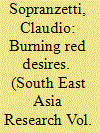

|
|
|
|
|
| Publication |
2012.
|
| Summary/Abstract |
The Red Shirt movement, which reached its peak during May 2010, has been met with puzzlement and ambiguity by media and scholars in and beyond Thailand. Often presented as a one-man-driven movement or a 'peasant revolt', the movement has remained opaque to many observers. This article analyses the ongoing conflict through the eyes of Isan (North Eastern Thai) migrants in Bangkok, especially motorcycle taxi drivers, as motivated by 'politics of desire'. In particular, the article explores how desires for consumption are voiced by a new emerging regional middle class with a diffuse feeling of being stuck between an agricultural past and a self-employed present, due to structural limitations on social and personal development. The author examines the historical emergences and failures of these desires in a complex web of conflicting and overlapping claims to representation, capitalism and class mobility. Positioning desires at the core of the analysis and exploring their configuration and suppression in Thailand through discourses of capitalist access, self-sufficiency and social justice allows severed links to be recovered and apparent contradictions to be reconfigured. This seems necessary to understand the otherwise disconnected and incomprehensible economic, discursive and spatial dimensions of the Thai political conflict.
|
|
|
|
|
|
|
|
|
|
|
|
|
|
|
|
| 3 |
ID:
089912
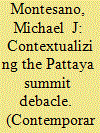

|
|
|
|
|
| Publication |
2009.
|
| Summary/Abstract |
The abrupt collapse of the ASEAN Plus Three and East Asian Summits at Pattaya on 11 April 2009 initiated four days of extreme political tension in Thailand. This tension both epitomized the current "red"-"yellow" polarization in Thai politics and society and represented the surface manifestation of deep pathologies in the Thai body politic. Four of these pathologies are the structure of the post-1997 economy, the figure of former Prime Minister Thaksin Shinawatra, the continuing war in the far south and concerns surrounding the end of the current reign. These pathologies leave Thailand in an incipient revolutionary situation, albeit one that must be clearly distinguished from the "revolution" that Thaksin tried to precipitate through street violence in April 2009. The seriousness of Thailand's pathologies notwithstanding, comparative perspectives offer the hope of peaceful progress towards the emergence of a new, more egalitarian Thailand.
|
|
|
|
|
|
|
|
|
|
|
|
|
|
|
|
| 4 |
ID:
095314
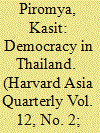

|
|
|
|
|
| Publication |
2009.
|
| Summary/Abstract |
According to Thailand's foreign minister Kasit Piromya, democracy in Thailand is going through some growing pains. It is hardly a struggle between democracy and dictatorship, nor one of the rural masses against the urban elite. Instead, it is one of patronage versus good governance-a struggle between old style patronage politics, ironically being led by former democratically-elected Prime Minister Thaksin Shinawatra, against the growing push for a democratic system guided by the moral compass of inclusiveness, transparency, accountability, good governance and the rule of law.
|
|
|
|
|
|
|
|
|
|
|
|
|
|
|
|
| 5 |
ID:
177618
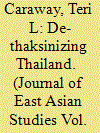

|
|
|
|
|
| Summary/Abstract |
Almost two decades after the initial victory of Thai Rak Thai, scholars still debate the forces behind Thaksin's rise to power. I revisit these debates and argue for a more explicit analysis of dynamics over time. I distinguish analytically between the founding moment of TRT's first victory and the subsequent reproduction of its dominance. I argue that TRT's financial muscle was a sufficient condition for its 2001 victory, that institutions merely contributed to the scale of its victory, and that its platform was not decisive. Once in power, however, institutions were instrumental in allowing TRT to complete its term, but more important for its long-term dominance was the rapid implementation of its campaign promises, which created a mass constituency that in turn made Thaksin-linked parties resilient at the polls despite institutional reforms designed to weaken their electoral performance.
|
|
|
|
|
|
|
|
|
|
|
|
|
|
|
|
| 6 |
ID:
092268


|
|
|
| 7 |
ID:
145614


|
|
|
|
|
| Summary/Abstract |
Thaksin Shinawatra, the former prime minister of Thailand, is one of the world’s most polarizing figures, whose words still reverberate across Southeast Asia. His tenure at the helm of the Thai government in the early 2000s marked a growing rift between Thailand’s urban middle class and the rural and working class who adore him. After more than two years of public silence and a decade after his ouster, the former prime minister spoke with World Policy Journal in New York City.
|
|
|
|
|
|
|
|
|
|
|
|
|
|
|
|
| 8 |
ID:
144657


|
|
|
|
|
| Summary/Abstract |
The concept of neo-royalism—being sacred, popular, and democratic—has served
as a formula of success during King Bhumibol Adulyadej’s long reign. However, in
the twilight of the Bhumibol era and with the obviously less able Crown Prince
Vajiralongkorn waiting to succeed, this concept poses a potentially dangerous trap
for the monarchy and its entire network.
|
|
|
|
|
|
|
|
|
|
|
|
|
|
|
|
| 9 |
ID:
082794


|
|
|
|
|
| Publication |
2008.
|
| Summary/Abstract |
Thailand's adoption of a new constitution in 1997 was meant to advance far-reaching reforms in the country's democratic development. A decade later, it is clear that these constitutional reforms failed. The Constitution unintentionally consolidated Prime Minister Thaksin's grip on power and indirectly precipitated the conditions for the 2006 coup. This article argues that the drafters' search for a more stable democratic government helped produce an electoral authoritarian regime that triggered the military to intervene
|
|
|
|
|
|
|
|
|
|
|
|
|
|
|
|
| 10 |
ID:
075472
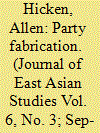

|
|
|
|
|
| Publication |
2006.
|
| Summary/Abstract |
Among the most interesting questions in Thai politics today is how to account for the rise and (until recently) the success of Thaksin Shinawatra and his Thai Rak Thai party. This article describes and analyzes some of the factors that contributed to the rise and success of Thaksin and Thai Rak Thai, arguing that neither Thaksin's personal assets nor the effects of the crisis are enough to explain Thai Rak Thai's rise and success. It focuses instead on the 1997 changes to Thailand 's constitution. These institutional reforms were crucial because they altered Thailand 's political-institutional landscape in fundamental ways. The reforms provided new opportunities and incentives for political actors that Thaksin and his party adeptly took advantage of. The argument presented is that the key reforms that helped pave the way for the rise of Thaksin and Thai Rak Thai were those reforms that helped reduce the number of political parties and that increased the power of the prime minister relative to coalition partners and intraparty factions.
|
|
|
|
|
|
|
|
|
|
|
|
|
|
|
|
| 11 |
ID:
123213


|
|
|
|
|
| Publication |
2013.
|
| Summary/Abstract |
This article analyzes the results of Thailand's 2011 election in the context of the prior six years of political turmoil. It argues that the election was a landmark in restoring the prospects for electoral democracy in Thailand.
|
|
|
|
|
|
|
|
|
|
|
|
|
|
|
|
| 12 |
ID:
115395


|
|
|
| 13 |
ID:
091429


|
|
|
|
|
| Publication |
2009.
|
| Summary/Abstract |
There is an underlying optimism in much of the literature that considers the emergence of social movements as being associated with deepening processes of democratization. The expansion of civil society is seen to expand political space. This paper takes a critical lens to this perspective, using recent political events in Thailand as a case study of the political strategies and alliances of social movements. We examine the debates that saw many social movements and their leaderships initially support elected Prime Minister Thaksin Shinawatra and his Thai Rak Thai Party only to see this support drain away as these same movements called on their followers to bring down the government. More importantly, we examine how these movements came to ally with conservative forces associated with the palace and military. Based on the Thai case study, we suggest that these seemingly unlikely outcomes result from the very nature of social movements. Leadership by middle-class activists, the need for alliances, the development of networks, and a focus on single issues and identities leads social movements to make substantial political compromises. The consequences can be negative for democratic development.
|
|
|
|
|
|
|
|
|
|
|
|
|
|
|
|
| 14 |
ID:
109036
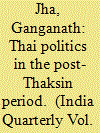

|
|
|
|
|
| Publication |
2011.
|
| Summary/Abstract |
hailand has been witnessing political uncertainties ever since the ouster of Prime Minister Thaksin Shinawatra. Although the 1997 Constitution of Thailand was one of the best in terms of evolving democratic institutions and Thaksin was one of the most popular leaders, yet the system could not work. Thaksin was disliked by the traditionally entrenched elite who joined together to remove him arbitrarily from power in which the military and the Royal Privy Council took a prominent part. The system that was adopted under military rule did not like to retain the 1997 constitution but decided to replace them with a new constitution (2007), in which the interests of the military were protected and promoted. In the evolving permutations and combinations, two groups-Yellow Shirts and Red Shirts-have emerged to oppose each other, often violently, to offer thesis and anti-thesis for and against Thaksin and his brand of politics. This article has tried to understand the dynamics of power politics in Thailand, the rise of the Yellow Shirts and Red Shirts and the emerging problems that Thailand will have to address in the future.
|
|
|
|
|
|
|
|
|
|
|
|
|
|
|
|
| 15 |
ID:
098407
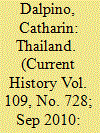

|
|
|
|
|
| Publication |
2010.
|
| Summary/Abstract |
Thailand runs the risk that future protes, a right and a mainstay of liberal democracy, will escalate quickly into violence and eventually be constricted as a matter of course.
|
|
|
|
|
|
|
|
|
|
|
|
|
|
|
|
| 16 |
ID:
129512


|
|
|
| 17 |
ID:
089915
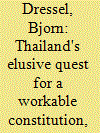

|
|
|
|
|
| Publication |
2009.
|
| Summary/Abstract |
The "People's Constitution" drafted in 1997 was seen as a watershed event in Thai constitutional history due to the breadth and depth of its reforms. Yet just ten years later, in August 2007, a new Constitution was promulgated, the 18th since Thailand became a constitutional monarchy in 1932. The latest version followed the ouster in September 2006 of Prime Minister Thaksin Shinawatra in a military coup. This article examines the main differences between the 1997 and 2007 versions of the Constitution and how these changes relate to the current unrest in Thailand. The analysis suggests that Thailand's current instability is best understood in terms of how social struggles over access to power played out in constitutional choices. Though Thailand's urban elites and middle class had driven the drafting of the earlier Constitution, when the populist leadership it produced threatened their interests they were quick to support the traditional military and royal networks in ousting the elected government and replace the People's Constitution with one that is deliberately less democratic. Yet, because the drafting process failed to generate support beyond narrow elite circles, and the new institutional arrangements no longer provide the inclusive governance Thai people have come to expect, the new Constitution has generated tensions that suggest Thailand is unlikely to experience stability any time soon.
|
|
|
|
|
|
|
|
|
|
|
|
|
|
|
|
|
|
|
|
|